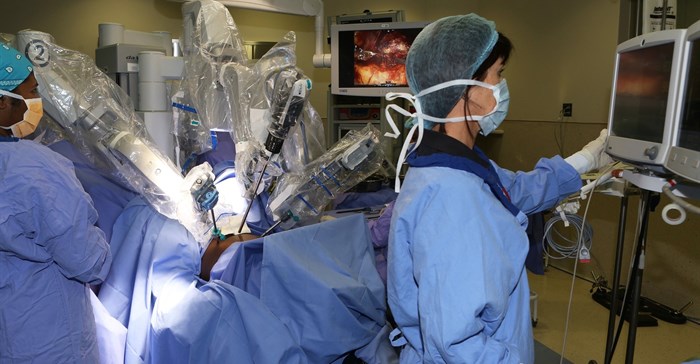






Robotic surgery to treat prostate cancer is growing by approximately 40% per year in South Africa and is increasingly being adopted as treatment of choice for high-risk and medium-risk cancer cases. Furthermore, this form of surgery is having a highly positive impact on local healthcare, and on urological medicine in particular, since its introduction in recent years.
This is according to Dr Greg Boustead, a specialist urologist and robotic surgeon, who was speaking about the outcomes that had been achieved by the Netcare da Vinci robotic programme.
Boustead, who has led the robotic-assisted surgery programme since its inception in June 2014 and has so far assisted in the training of 18 surgeons using the da Vinci system at Netcare Waterfall City, Netcare Christiaan Barnard Memorial, and Netcare uMhlanga hospitals, says that there are now more than 3,500 of these machines globally, and more that 80% of all radical prostatectomies are being performed .
“In the study, robotic surgery patients had a hospital stay of almost half the duration as with traditional open prostate surgery - a median of 3,2 days, when compared with a median of six days in the open surgery patients.
“Perhaps even more important, the patients suffered less than half the complication rates than those individuals who underwent open surgery. The risk of severe complications arising from robotic-assisted surgery was substantially lower at 1,6%.”
The aim of the study was two-fold: Firstly, to ensure the safe rollout of a local robotic prostatectomy initiative that would achieve outstanding cancer control and good outcomes in multi-speciality hospital environments, while simultaneously training surgeons.
“Secondly, we were also able to compare the length of hospital stay and complication rates with a cohort of age-matched men treated over the same time period by means of traditional open radical prostatectomy in similar facilities.
“When we look at single surgeon data of our highest volume surgeons, both blood loss and continence outcomes continue to improve as surgeons gain more experience. Just 1,7% of the men who underwent robotic-assisted surgery required a blood transfusion during the procedures.
“Outcomes with regard to urinary continence and recovery of sexual function were excellent and equivalent to those of other studies conducted around the world into robotic-assisted prostatectomies.”
“Studies from around the world are confirming a lower risk of primary treatment failure after robotic-assisted surgery. Primary treatment failure may then require secondary treatment, which carries the risk of additional side effects as well as substantially increased costs,” explains Boustead.
The robotic surgical teams need to be highly trained and the hospital group has introduced thorough training initiatives for urologists and support staff. These cover both product and clinical aspects through a series of online modules, simulator training, as well as hands-on surgery performed in an accredited training laboratory in Belgium. As the programme’s proctor, Boustead oversees the procedures until the doctors are fully versed and well experienced in the use of the robotic technology.
Boustead presented the findings of this study at the World Congress of Endourologyand the South African Urological Association Meeting, which is being held in Cape Town from 8 to 12 November.